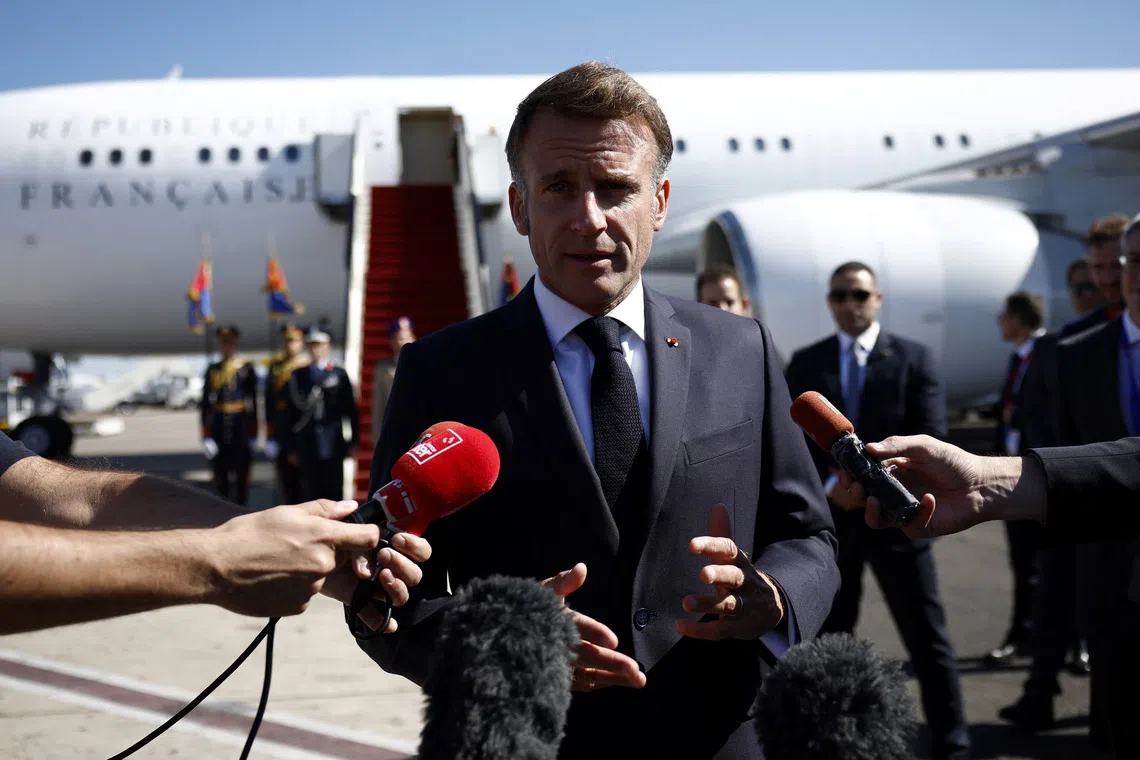France’s Macron won’t resign as no-confidence votes threaten his new government
Sign up now: Get ST's newsletters delivered to your inbox

French President Emmanuel Macron's latest government is being threatened by two no-confidence motions that could bring it down by the end of the week.
PHOTO: REUTERS
PARIS – French President Emmanuel Macron rejected calls to resign and blasted his opponents on Oct 13, as his latest government was threatened by two no-confidence motions that could bring it down by the end of the week.
France is in the midst of its worst political crisis in decades as a succession of minority governments seeks to push deficit-reducing budgets through a truculent legislature split into three distinct ideological blocs.
Mr Macron has burned through five prime ministers in less than two years, and many of his rivals have said the only way out of the crisis is for him to call fresh legislative elections or resign – both of which he has refused to do.
Shrinking confidence
Shortly after arriving in Egypt on Oct 13 to attend a meeting to end the war in Gaza, Mr Macron was defiant, blaming his rivals for destabilising France and saying he had no plans to step down before his second and final term ends in 2027.
“I ensure continuity and stability, and I will continue to do so,” he said, urging people not to forget that the mandate given to the president means “to serve, to serve and to serve”.
On Oct 10 , Mr Macron reappointed Mr Sebastien Lecornu
Mr Macron’s office announced Mr Lecornu’s new Cabinet late on Oct 12
Both the hard-left France Unbowed party and the far-right National Rally (RN) filed no-confidence motions on Oct 13.
Mr Lecornu will face a no-confidence vote, most likely on Oct 16. It is unclear if he has the votes needed to survive, as the Socialists – whose support he will almost certainly need to fight on – are keeping their options open.
The Socialists want Mr Lecornu to repeal Mr Macron’s pension reform and roll out a billionaires tax, measures the right outright rejects.
“There will be no censure if the prime minister commits to abandoning Article 49.3 and suspending the pension reform,” Socialist lawmaker Philippe Brun told Reuters, referring to the constitutional tool used to ram legislation through Parliament without a vote and echoing remarks by party secretary Olivier Faure on Oct 12.
Mr Lecornu, already France’s shortest serving prime minister with a first term that lasted just 27 days, has not ruled out resigning again if he cannot fulfil his mission.
RN party president Jordan Bardella, when asked on TF1 TV whether he would support a motion by the hard-left, said: “I’m not a sectarian... I believe that France’s interest today is to ensure that Emmanuel Macron is stopped in his tracks”.
Budget pressure
The newly appointed Cabinet was scheduled to meet for a first time on the afternoon of Oct 13 and must present a budget by Oct 15.
France has the euro zone’s largest deficit, and Mr Macron has tasked a string of prime ministers with passing slimmed-down budgets.
Mr Michel Barnier was the first to try, but he was toppled by Parliament in December 2024 for his proposed budget cuts to the 2025 budget.
His successor Francois Bayrou managed to get the 2025 legislation over the line, but he was ousted in September over his proposals for the 2026 budget
“The political forces that decided to vote against Francois Bayrou and the political forces that sought to destabilise Sebastien Lecornu are solely responsible for this mess,” Mr Macron said. REUTERS


